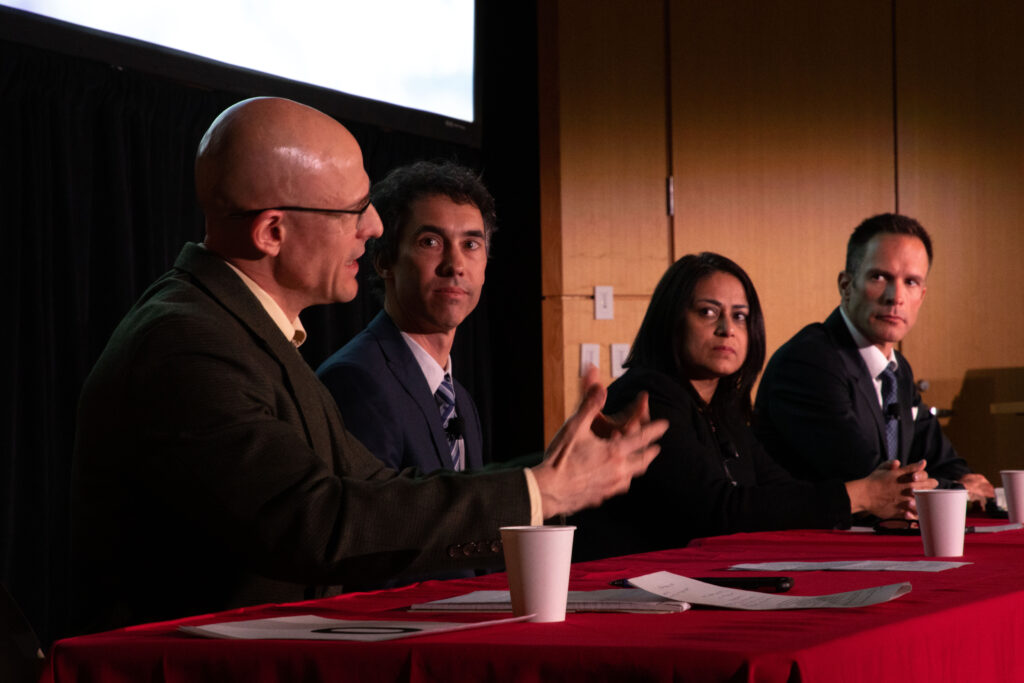INAUGURATION ACADEMIC SYMPOSIUM – APRIL 29, 2022
Climate change work must extend beyond research

Climate change is “the challenge of our time,” according to Robert Johnston, director of the George Perkins Marsh Institute — but it’s one that Clark University researchers are well prepared to meet. In fact, they’ve been confronting it for decades.
In “Global and Climate Change,” four of the University’s internationally renowned scholars shared their individual work, along with a common goal: that their research will inform action and help society effect transformational change. The April 29 discussion was part of the Academic Symposium, one of the events held to celebrate the Inauguration of President David B. Fithian.
Joining Johnston on the panel in Razzo Hall were Edward Carr, director of the International Development, Community, and Environment Department; Rinku Roy Chowdhury, associate professor of geography; and Christopher A. Williams, professor of geography and director of environmental science.
Carr recently served as a lead author of “Climate Change 2022: Impacts, Adaptation and Vulnerability,” the report of Working Group II of the Intergovernmental Panel on Climate Change — the agency’s reports form the basis of climate change negotiations between governments on a global scale. He sees shaping policy and implementing interventions as a large part of his role.
“If all you’re doing is research and publishing in journals, you’re effectively throwing it over a wall and hoping someone reads it,” Carr said.
How do you make climate change adaptation more effective? Start with research, work on policy, move that into implementation — and then do it again, Carr said. “Learn from all those things to reinform your questions. That, to me, is at the heart of climate action — and is one of the most exciting things about the work I get to do here at Clark.”
Roy Chowdhury, who researches global land use and land cover change, noted that Clark has been at the forefront of land-use research since Clark’s geographers organized the 1987 conference “The Earth as Transformed by Human Action.” The subsequent publication, “The Earth as Transformed by Human Action: Global and Regional Changes in the Biosphere over the Past 300 Years,” examined the major human forces that impact climate change.
In 2019, Roy Chowdhury was a coordinating lead author of the global assessment report of the Intergovernmental Science-Policy Platform on Biodiversity and Ecosystem Services. She recently co-authored a study that included principles that can guide scientists, policymakers, and practitioners to meet sustainability challenges in land use, another example of research leading to climate change action.
Johnston addressed the issue of how we protect ourselves from the hazards of a changing climate — namely sea-level rise and increased severity and incidence of coastal storms. “A myriad of adaptation options are available,” he said, “but all involve costs and tradeoffs.”
Research on coastal preservation can be used to work with communities on the Eastern shore, “to get from where they are to where they want to be,” Johnston said.
Williams, who leads the Biogeosciences Research Group at Clark, said his “use-inspired research” has real impact in the world. “We try to research things that are important to society, and we’re excited to keep doing that at Clark — a smaller institution with an outsized impact in global and climate change,” he said.
He said that society is on the verge of a massive transformation — in energy production, transportation, heating, cooling, and “the way we power society at large. I’m sure people don’t realize just how close we are to being able to solve this problem with the technology we have at our fingertips.”
Noting that “President Fithian has inspired us to think big in a culture of possibility,” Wiliams suggested the creation of a new incubator at Clark to focus on the transition to clean energy and building on existing foundational research. “Its goal would be to equip society with the tools needed to get from where we are now to where we go in the future — a deep decarbonization of society.”
“Society needs bold new design thinking on this crucial topic — and I think Clark is just the place to fill this gap,” Williams said.
Read about the other sessions held for the Academic Symposium, one of the events celebrating the Inauguration of President David B. Fithian:
- Professors explore counternarratives of design and innovation
- Faculty put advanced digital technology to use in the classroom and lab
- Symposium session addresses Clark’s impact in the community
- ‘The truth is what we see on the ground’
- Faculty researched, and learned from, the pandemic
- Life, and death, considered through the lens
- Academic Symposium inspires discussion on consequential concerns


